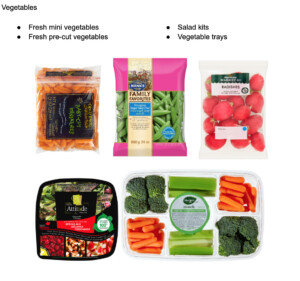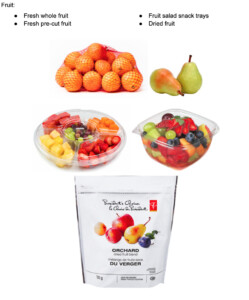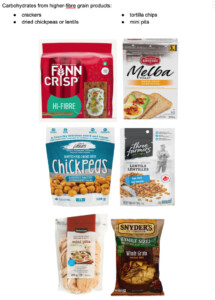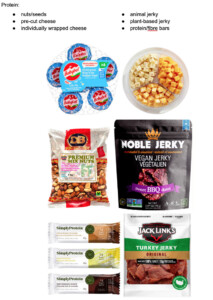
Navigating Summer Nutrition
By: Ola Pabjas, Registered Dietitian, Reviewed & Edited by JM Nutrition Team
How do you navigate summer nutrition? Well, we’ve prepared a handful of summer nutrition tips that you can readily apply to your daily life.
About Summer Nutrition
Summer is no doubt a beloved season that brings with it many delightful experiences. From short-notice social gatherings and outdoor barbecues to beach picnics and hiking adventures, summer offers many opportunities for fun and relaxation. These frequent (but welcomed!) disruptions to our routines can make maintaining a balanced approach to nutrition challenging.
A less consistent schedule, however, doesn’t mean you must abandon your commitment to your established health goals (whether managing acid reflux, blood sugars, or cholesterol or simply ensuring you feel your best). It also doesn’t mean we don’t get to participate in the experiences summer has to offer. Not at all.
For this reason we felt we should present a few ideas to help you balance enjoying seasonal activities and the foods accompanying them in ways that keep you feeling your best.
Related: Foods That Hydrate
Summer Nutrition Tips
1. Prioritize Hydration
No summer nutrition tips list would be complete without the most obvious of piece of advice: the importance of hydration.
With rising summer temperatures and outdoor activities, our bodies lose more fluids through sweat. Distraction and busyness may also interfere with our ability to recognize our thirst.
As a result, dehydration can make us feel lethargic and sick. This may cause us to choose foods that don’t align with our health goals. These foods typically offer a burst of energy and spike in blood sugar, followed by an energy crash and a blood sugar nosedive.
Related: How To Boost Energy
Dehydration may also be misinterpreted for hunger, leading to unnecessary eating or overeating at meal times.
For this reason, aim to drink water consistently throughout the day, whether carrying an insulated water bottle with you or regularly asking for (and actually drinking) water at restaurants or cafes. If you’re feeling sluggish, ask yourself when you last had a refreshing glass of cold water.
Be intentional about using the washroom. Before you leave any indoor or outdoor location, take advantage of having access to a toilet and use it. Do so even if you don’t feel you have to go. Thinking ahead makes you less likely to be stuck in a situation where you need to use the washroom when one may not be as readily accessible.
2. Take Advantage of Seasonal Produce
To successfully navigate summer nutrition, take advantage of season produce.
Undoubtedly, summer offers an abundance of fresh fruits and vegetables that taste best at this time and provide essential nutrients. Eating fruits and vegetables can also help hydrate the body.
Related: How To Introduce More Vegetables
Embrace the season’s produce by experimenting with colourful recipes showcasing summer’s vibrant fruits and veggies.
In addition, we strongly recommend to stop at roadside produce stands where you can pick up fresh seasonal offerings.
What’s more, this is a great way to support a small, local business.
You can also do grocery shopping on Wednesdays, when new produce typically arrives. Grocery stores can set great deals midweek on many foods to make room for new food shipments.
Last, consider a visit to the local farmers’ markets just before closing when sellers are more likely to give discounts on remaining produce.
3. Practice Mindfulness and Avoid All-or-Nothing Mentality
Remember that occasional indulgence is part of a balanced diet. There’s certainly no need to feel guilty for enjoying a treat once in a while. Indulging in seasonal treats and special meals is part of the joy of summer.
We also encourage you to adopt a mindful approach when eating or drinking. That is, try to be fully present with the experience, and savour each bite or sip. There’s no need to beat yourself up and compensate later or punish yourself for “breaking the rules.”
Furthermore, it’s important to enjoy what you’re eating and drinking. Enjoy the lovely people you’re doing it with. Enjoy the beautiful place where you’re doing it. Then, move on with your life… Know you’ve had–and still have–several opportunities that day to choose foods that nourish your body.
The more you cultivate this mindset, the less likely you are to engage with food in extreme ways. This applies to summer nutrition, as well as any other time of the year.
Related: How to Create a Healthy Food Environment
4. Mind Your Alcohol Intake
This is an indispensable summer nutrition tip.
Reason being, alcoholic beverages are often a big part of social gatherings and summer festivities.
Excessive alcohol consumption, however, can sabotage our health and summer nutrition goals.
It’s important to keep in mind that alcoholic drinks don’t offer any nutritional benefits you can’t otherwise get from food.
Alcohol can also decrease our gut microflora, lead to dehydration, increase inflammation, and negatively impact our mental health and motivation. For these reasons it should be limited.
Related: Short-Term Effects of Alcohol
Summer nutrition tips surrounding alcohol:
- Resort to low-ABV (Alcohol By Volume).
- Give non-alcoholic options a try.
- Alternate alcoholic drinks with water.
- Select sugar-free options when possible.
- Never drink on an empty stomach.
5. Plan Ahead
Planning also plays an integral in navigating summer nutrition.
Unquestionably, the diet quality of those who plan and prepare food at home more often is higher than those who spend little time planning and preparing food. And this is a strategy that our weight management dietitians use frequently when providing counselling to their clients. Therefore, planning can go a long way to ensure appealing, nourishing foods remain available to you when spending more time away from home in the summer.
Related: Meal Planning and Prepping Strategies
You can simply get a cooler bag with ice packs and pack various foods to throw together simple, balanced meals and snacks. Don’t hesitate to take shortcuts at the grocery store and buy pre-cut vegetables and fruits, salad kits and nutritionally dense packaged items.
Related: Best Ways To Save Money On Groceries
What’s more, it doesn’t have to be fancy. Just follow the Balanced Plate concept; bring vegetables or fruit, protein and carbohydrates from higher-fibre grain products or legumes.
Here are some examples from each category:



6. Group Meal Planning
Another summer nutrition tip centres around group meal planning.
Meal planning in groups and organizing pot-lucks can help share the responsibility of feeding friends and family.
Once again, use the Balanced Plate concept to decide what foods to include.
When you engage in group meal planning or potlucks, you effectively strengthen social bonds and encourage a supportive environment for a balanced, enjoyable experience.
In these scenarios, each participant or family member can be assigned to bring a specific dish (i.e. vegetable, fruit, carbohydrate, animal protein, plant protein). This ensures a diverse spread of nutritious options for everyone to enjoy.
Remember to assign someone for the family-favourite recipes and dessert too!
Conclusion
Summer is all about relishing the moment and nourishing your body and spirit. So when it comes to summer nutrition and food, enjoy yourself thoroughly and thoughtfully.
If you require assistance of a registered dietitian with meal planning or regarding any other nutrition matter, you can book an appointment with an on-site or online dietitian or simply request a free consultation.
References
1. Wang, H. J., Zakhari, S., & Jung, M. K. (2010). Alcohol, inflammation, and gut-liver-brain interactions in tissue damage and disease development. World journal of gastroenterology: WJG, 16(11), 1304.
2. Monsivais, P., Aggarwal, A., & Drewnowski, A. (2014). Time spent on home food preparation and indicators of healthy eating. American journal of preventive medicine, 47(6), 796-802.
3. Ducrot, P., Méjean, C., Aroumougame, V., Ibanez, G., Allès, B., Kesse-Guyot, E., … & Péneau, S. (2017). Meal planning is associated with food variety, diet quality and body weight status in a large sample of French adults. International journal of behavioral nutrition and physical activity, 14(1), 1-12.
4. Warren, J. M., Smith, N., & Ashwell, M. (2017). A structured literature review on the role of mindfulness, mindful eating and intuitive eating in changing eating behaviours: effectiveness and associated potential mechanisms. Nutrition research reviews, 30(2), 272-283.
Other Popular Posts:
Nutrition and Stress Management
Ola Pabjas is a registered dietitian who focuses on weight-neutral approaches to health, digestive health support, chronic disease prevention and management, and more.
Our nutrition blog has been named one of the Top 100 Nutrition Blogs, Websites and Newsletters to Follow in 2021 & 2022 and one of the Top Canadian Nutrition Blogs by Feedspot. So don’t miss out and subscribe below to both the newsletter that includes latest blog posts.
JM Nutrition is a nutritional counselling service by dietitians and nutritionists in Canada. Main area of service: dietitian Ontario, main office: nutritionist Toronto.
Also visit the following pages: nutritional counselling Ottawa, nutritionists Halifax, dietitians Vancouver, nutritionists Edmonton, nutritionists Calgary, dietitians Saskatoon, dietitians Regina and more.



